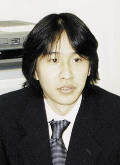|
Dennotai
Co., Ltd. -- students get the Net
By Noriko Takezaki
 Yusuke
Tanaka
Yusuke
Tanaka |
Cutting-edge Internet
technology, English ability, and an evangelist-like approach have emerged as the
three sacred Grails for venture company success in Japan. Firms that have found
the three are starting to rock Japan's conservative business climate, and they're
starting to enjoy more opportunities than even just a couple years ago. One such
company is Dennotai, a venture formed by eight Tokyo Generation X'ers, helped
out by some dozen part-time undergrad and grad students. Dennotai is no lemonade-stand
operation; the founders are aiming at no less than developing and promoting their
own WAP (wireless application protocol)-related software applications for Japan's
booming cellular phone market.
The applications
being developed by Dennotai are based on HDML -- Handheld Device Markup Language,
a programming standard proposed by the former Unwired Planet (now renamed Phone.com)
-- which serves as the basis for WML (Wireless Markup Language), a component of
the WAP protocol being developed by the WAP Forum. This is no small stuff; The
WAP Forum was established by major mobile players, including Motorola, Nokia,
Ericsson, and Unwired Planet (UP), and compliant software can expect to enjoy
widespread deployment (read: great sales) when 3rd generation mobile telephony
comes to the world. (See "Third Generation
Mobile: Three Groups for 3G" in the April 1999 CJ -- Ed.) HDML technology
has been adopted by Japan's DDI and IDO phone companies for their Internet-connected
cellular phone services EZweb and EZaccess, which were successfully launched early
this year. Clearly, the Dennotai kids are on to something.
A meeting of
minds
Dennotai originally started as a joint university students' Internet circle (club)
in 1995, comprising students from Tokyo's Keio and Aoyama Gakuin Universities.
Club members first encountered HDML when UP's vice president of marketing, Ben
Linder, visited Japan two years ago. Dennotai's president, Yusuke Tanaka, met
Linder through a common friend, and the two agreed to work together to promote
non-PC applications based on UP's technology for the Japan market. Since then,
Dennotai has also approached DDI and IDO to enlist their support for HDML-based
services, which would compete with NTT DoCoMo's compact HTML technology standard
-- a standard that the telecom giant intends to deploy with its i-mode service.
In addition to the two telecom carriers, Dennotai has been dealing with major
Japan companies, including Hitachi, Sony Communications Network, Nihon Victor,
and the Mitsubishi Research Institute. The upside of all this activity is that
Dennotai's 1999 revenues should hit the JPY100 million mark.
"Our strategy
is to enter a field where the conservative nature of business has traditionally
prevented the acceptance of new ideas, and to exploit and sell our unique ideas
on an evangelist basis," says Tanaka, still president of Dennotai, though he's
barely halfway through his third decade. "Establishing relations with the WAP
Forum was an interesting opportunity for us. This business has been worth developing
because the mobile market is global, and competitive telecom carriers in Japan,
like DDI and IDO, are willing to accept new technology and new ideas as a way
to beat NTT DoCoMo."
Working with
WAP
For promotion of WAP-related technology in Japan, Dennotai organized WAP-NET last
year as a research and investigation community focusing on WAP-related technologies
and on services and contents based on WAP. Dennotai's aim was to serve as mediator
between the WAP community in the US and Japan players, making full use of Dennotai's
accumulated WAP expertise, as well as members' English abilities. At first, Dennotai
alumni didn't realize how much of an advantage these two factors gave. For the
20-somethings who have grown up in the global Internet boom -- even in Japan --
Net technology know-how and English knowledge are skills acquired quite naturally.
"We were surprised to discover that being able to use English for business is
still something rare in the Japanese market," says Tanaka.
One headache,
however, is the widespread speculation here that the DDI and IDO WAP-related services
don't stand a chance against NTT DoCoMo's i-mode. "However, the WAP Forum includes
some of the world's major telecoms and open specifications" states Tanaka, with
optimism. Nonetheless, Dennotai has changed marketing strategy this year, from
WAP-centric to WAP and i-mode, showing a quick grasp of the principles
of hedging. The company has released new software, including Webpage Tool and
network games, which are compatible with both the WAP-based EZweb and EZaccess
services and NTT's i-mode.
Cash flow woes
-- not
For now, the company enjoys strong support from the Ministry of International
Trade & Industry (MITI), as part of the ministry's measures to nurture and promote
Net-based venture companies. Although free from cash worries now, Tanaka and company
are considering accepting some initial investment from as-yet-unnamed VC sources,
and he has indicated a willingness to discuss M&A offers from any quarter. "We
are not a traditional Japan SE that tries to stick to their own technology and
territory," says Tanaka. "Internet business has been growing quickly and the Net
business climate has been changing quickly. Why should we follow the way things
were done in the past?" Clearly, the kids from school are learning how to graduate
to the Internet big times.
Dennotai Co., Ltd.
3-30-13-101, Ebisu,
Shibuya-ku, Tokyo 150-0013
Tel: +813-5447-7108
Fax: +813-5798-7621
http://www.dennotai.co.jp
Back
to the Table of Contents
Comments
or suggestions?
Contact cjmaster@cjmag.co.jp

|

